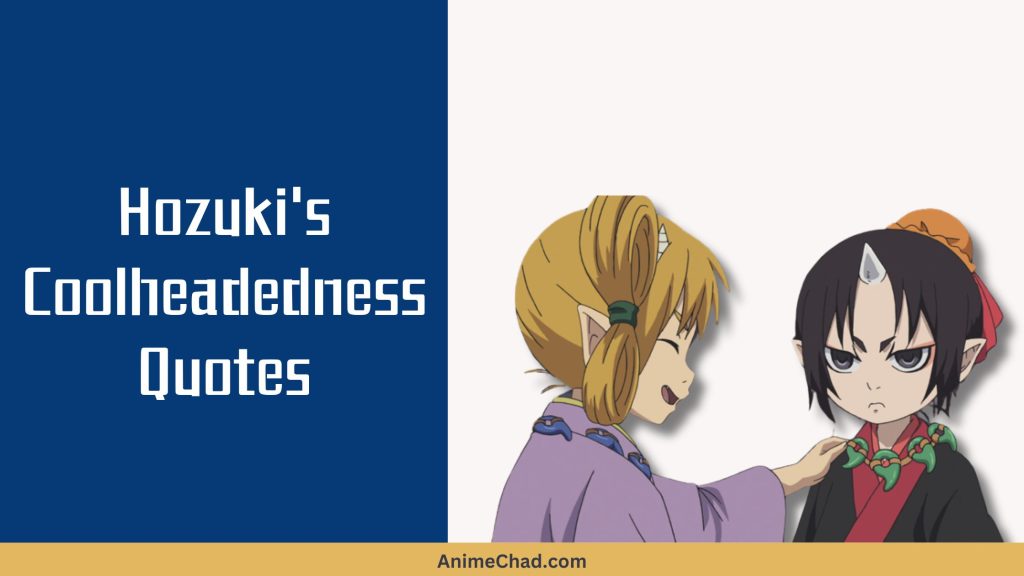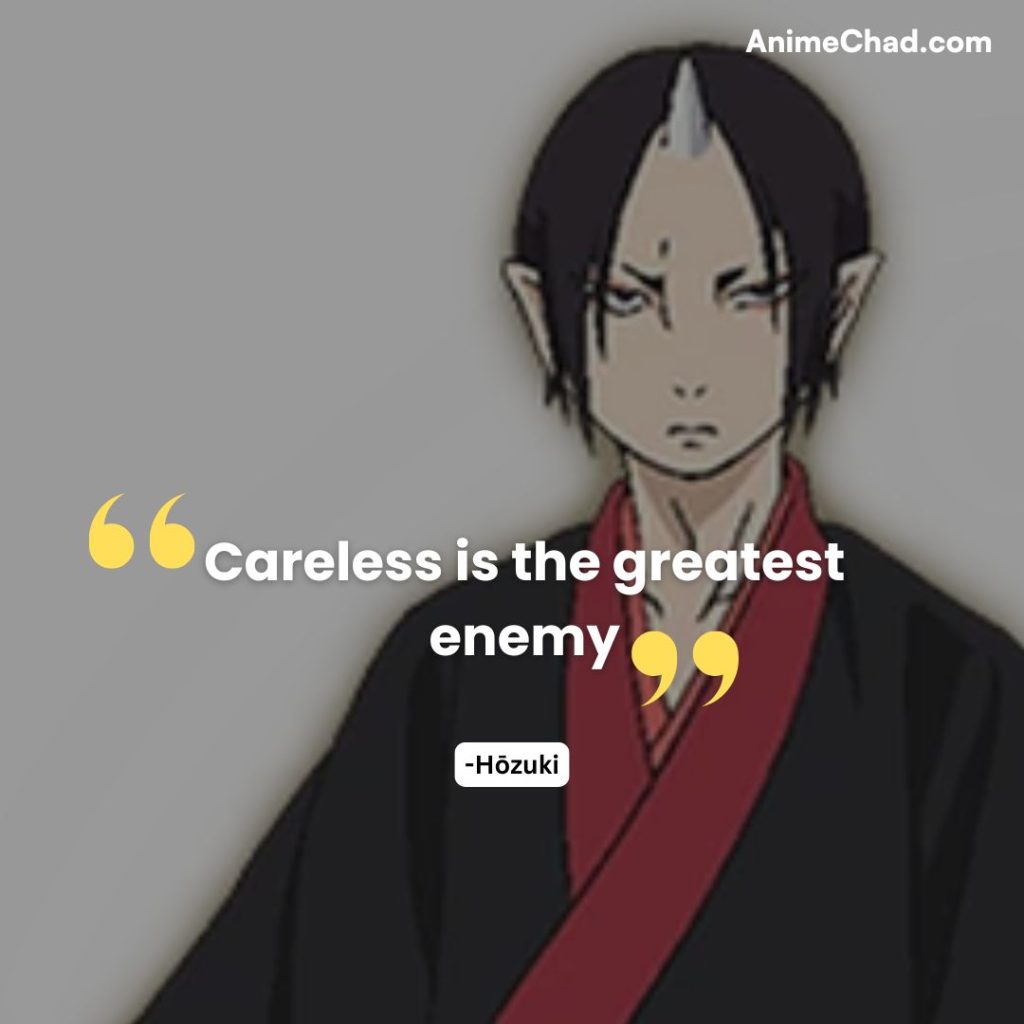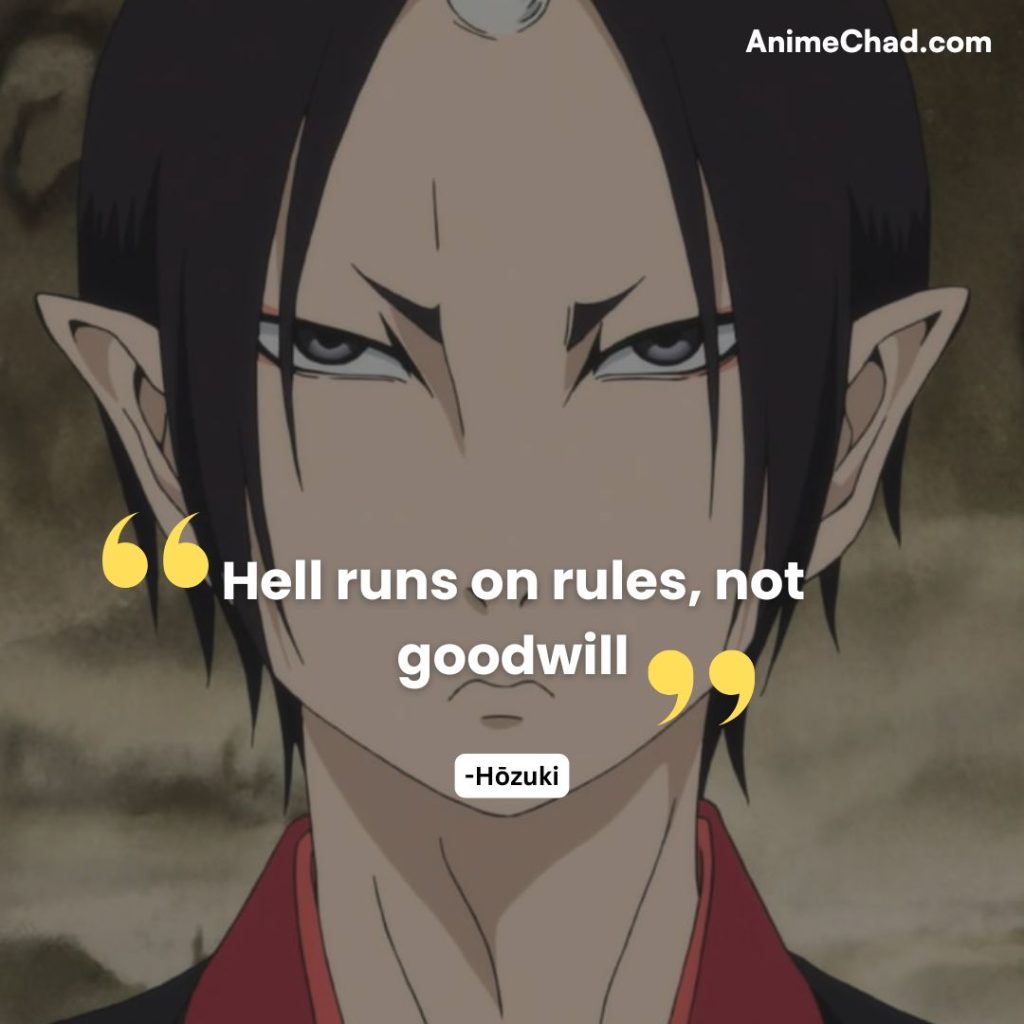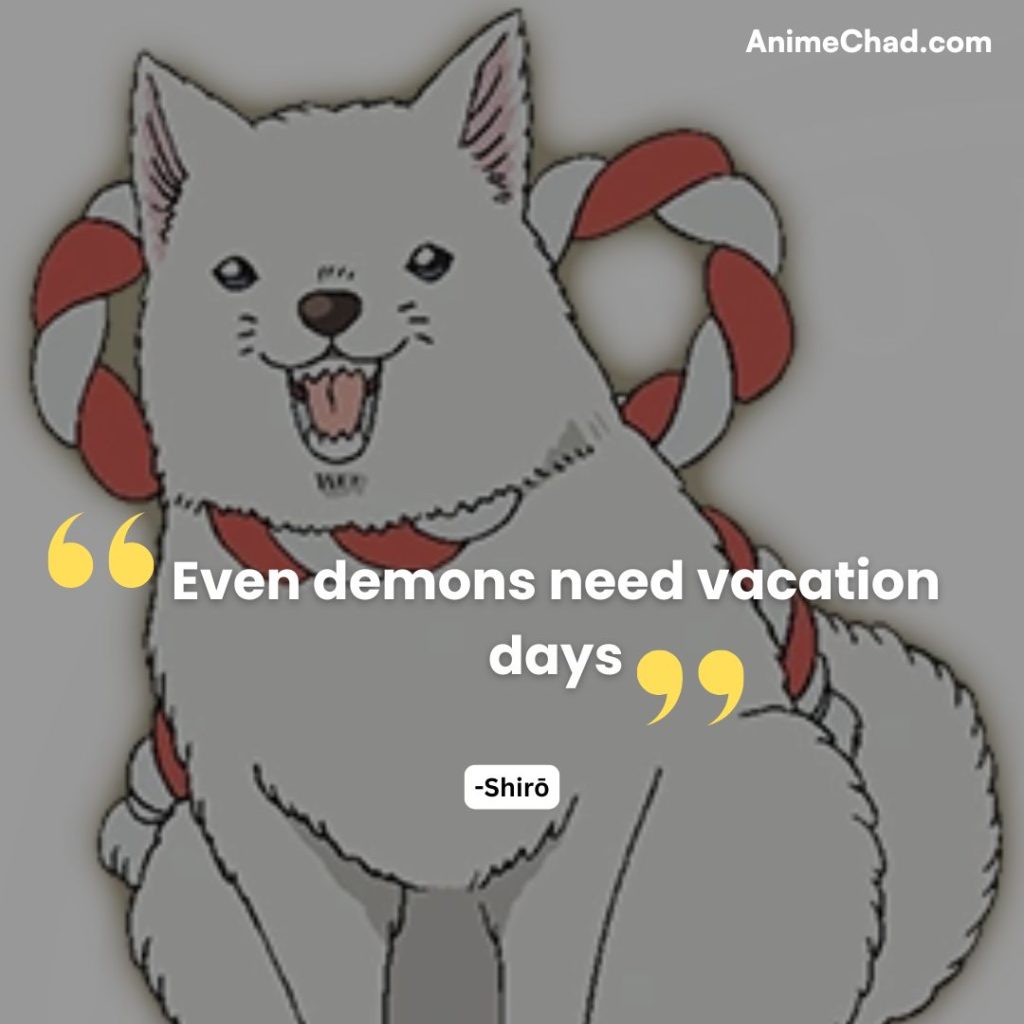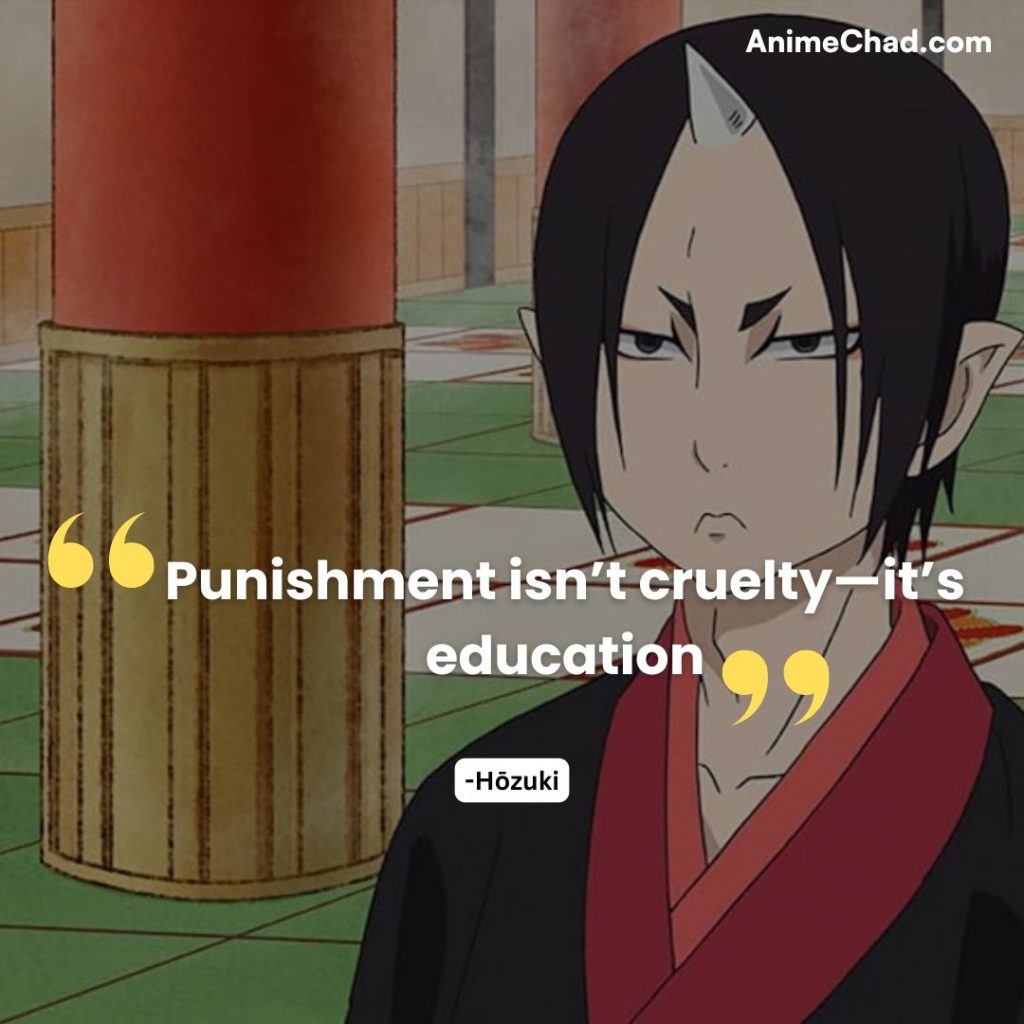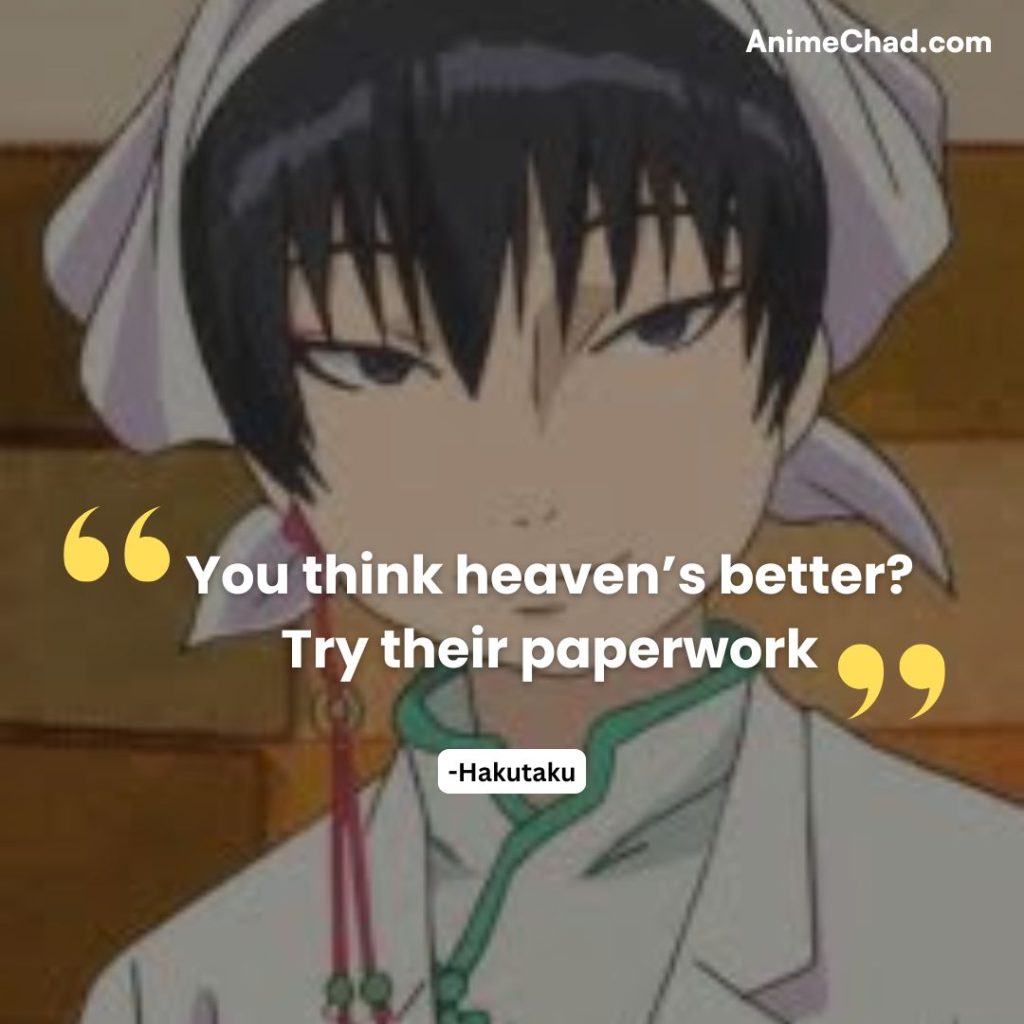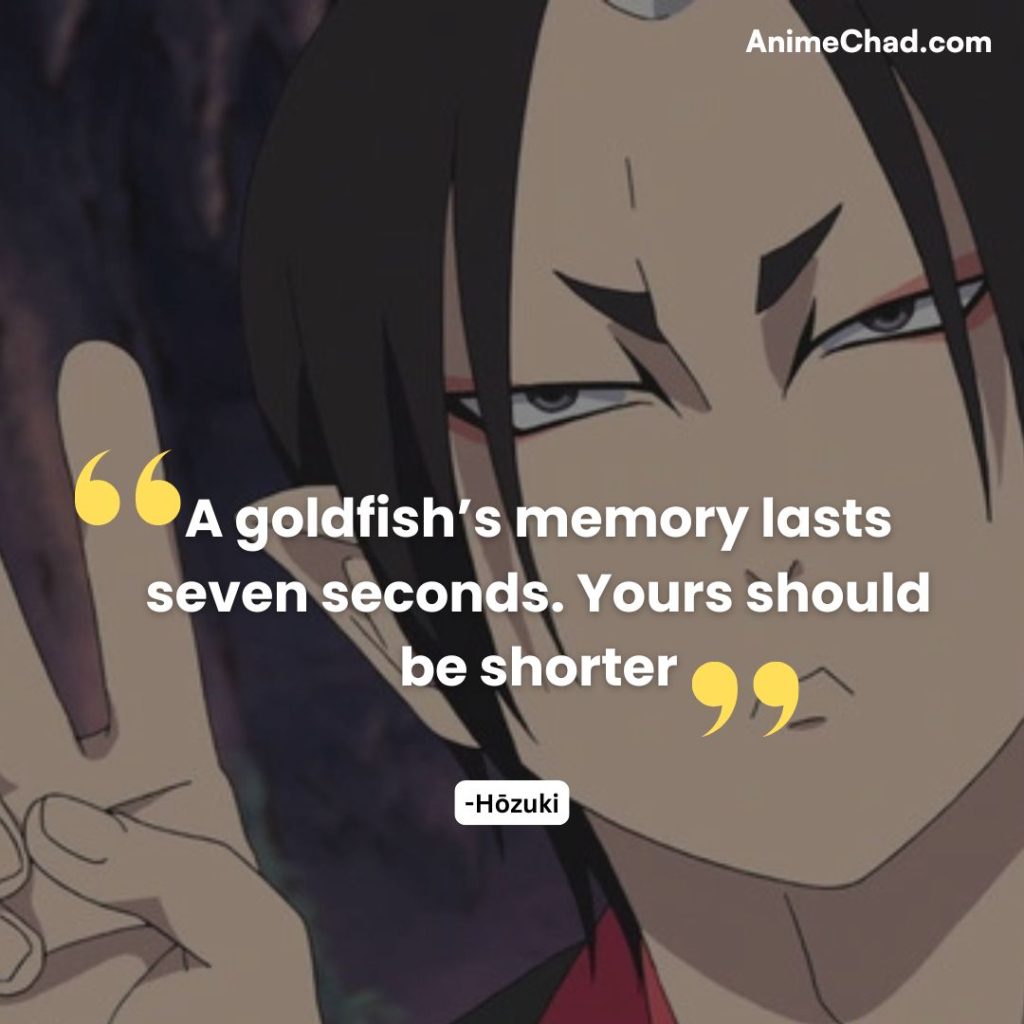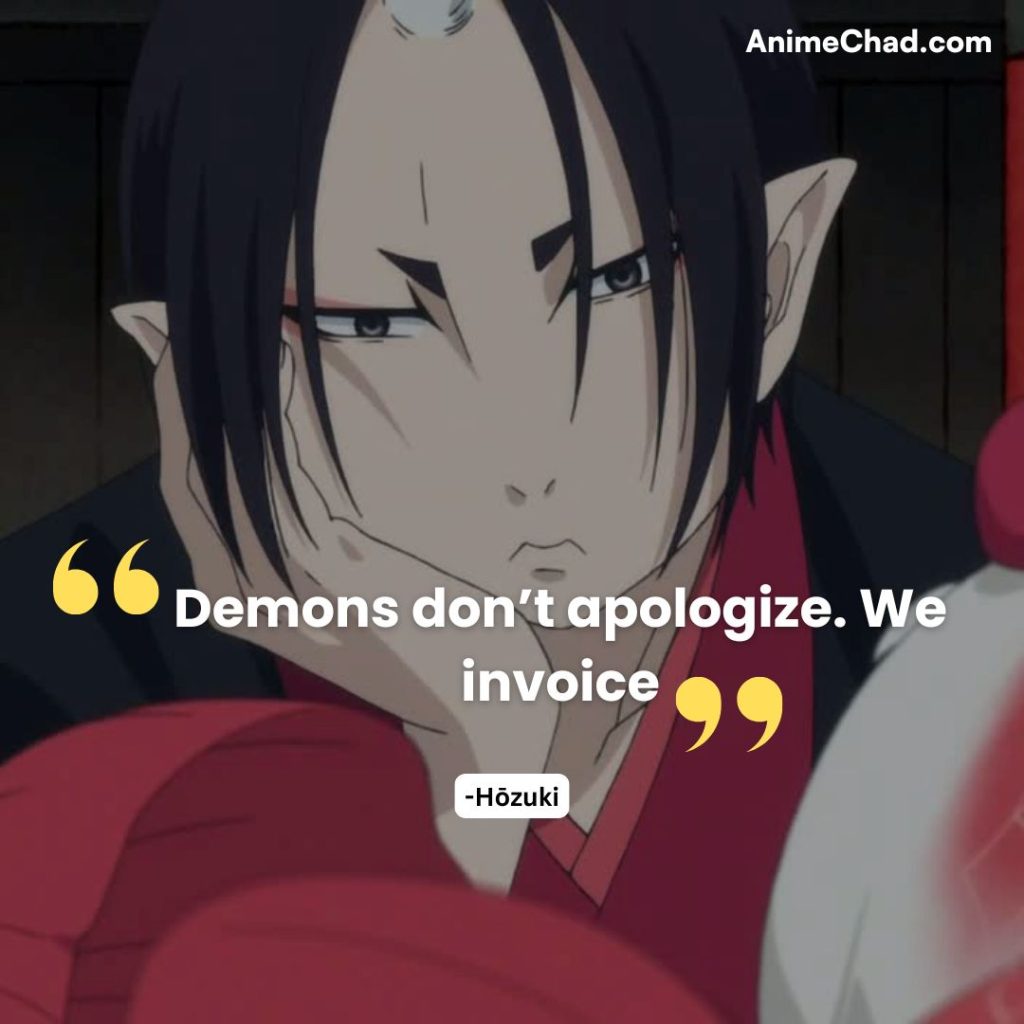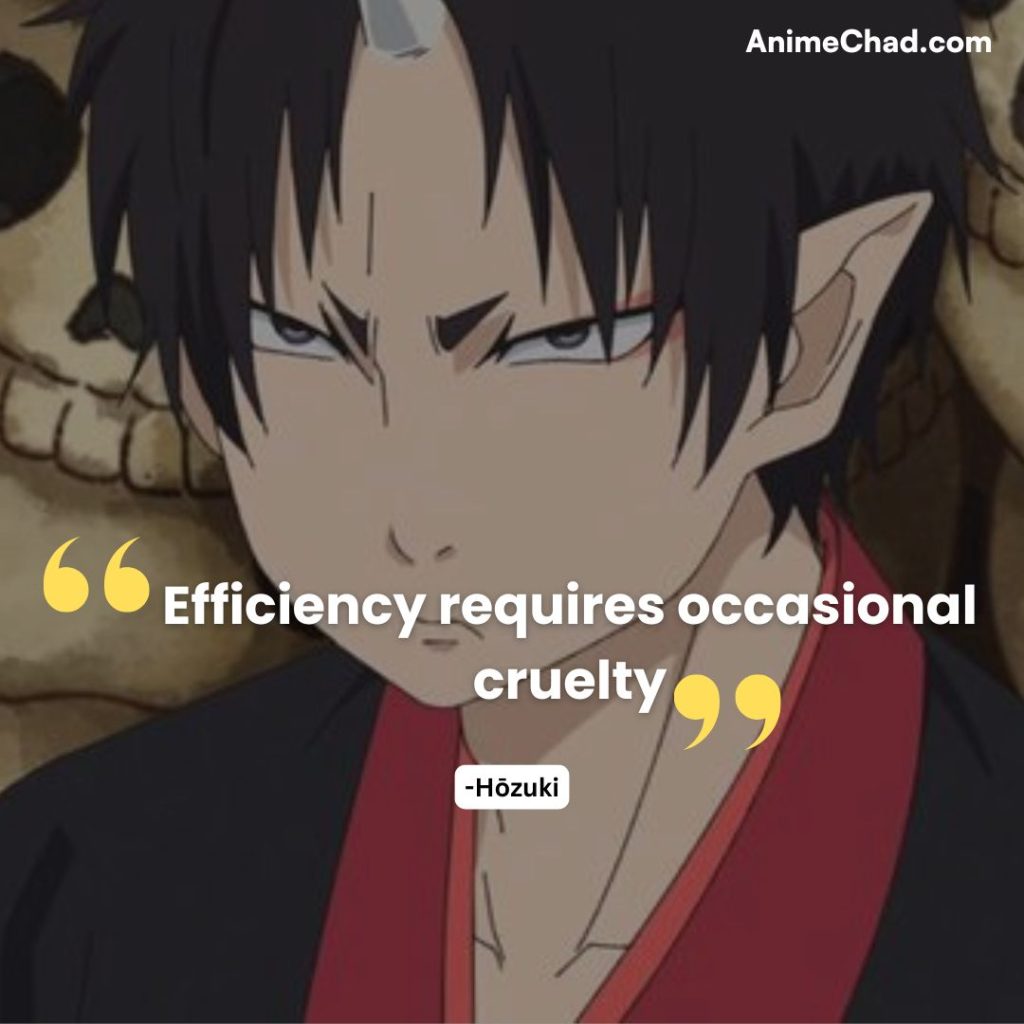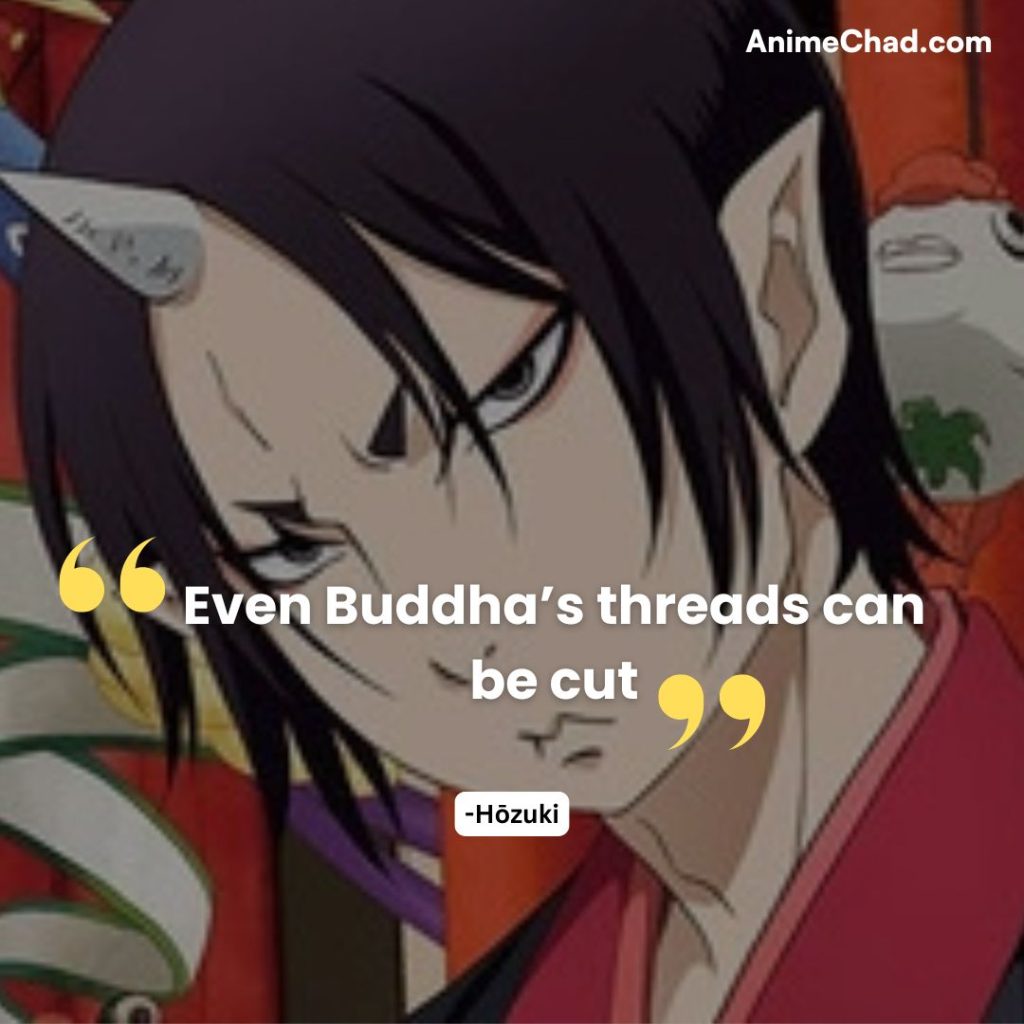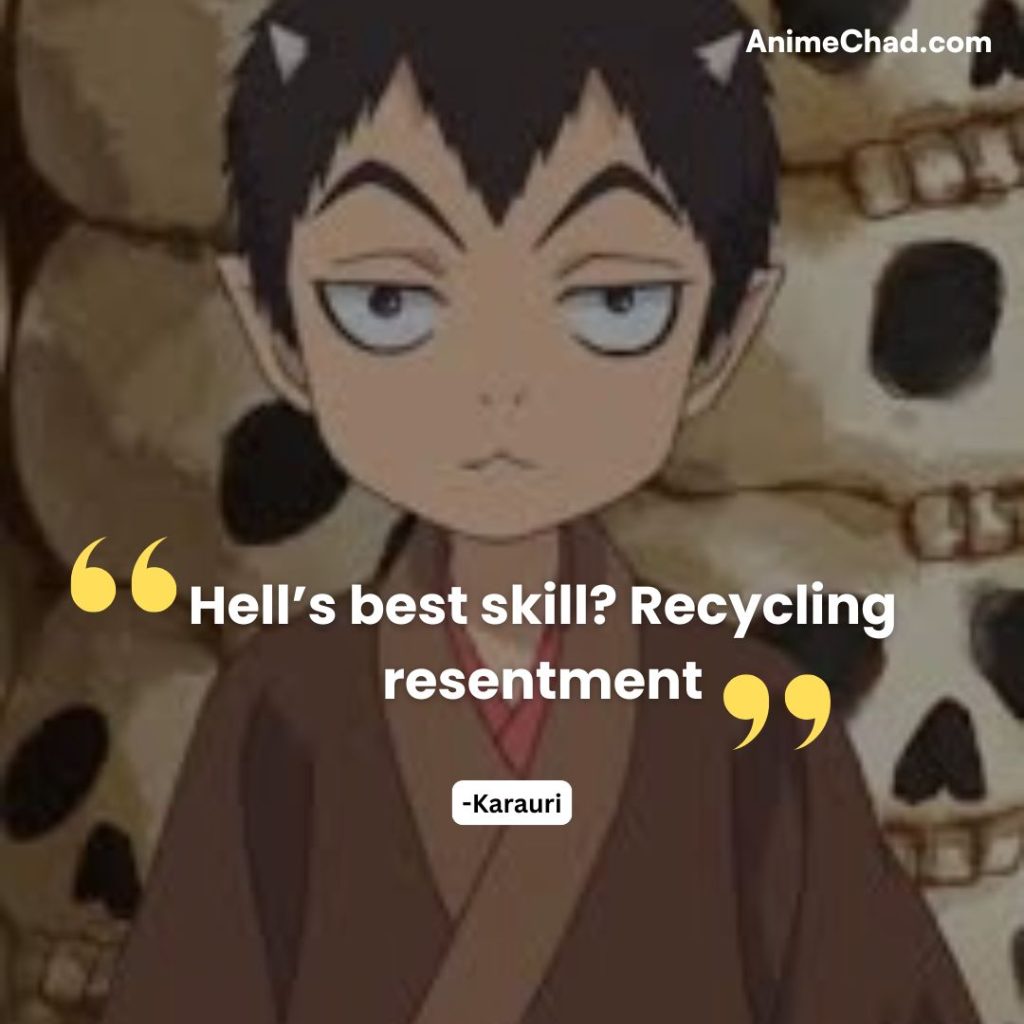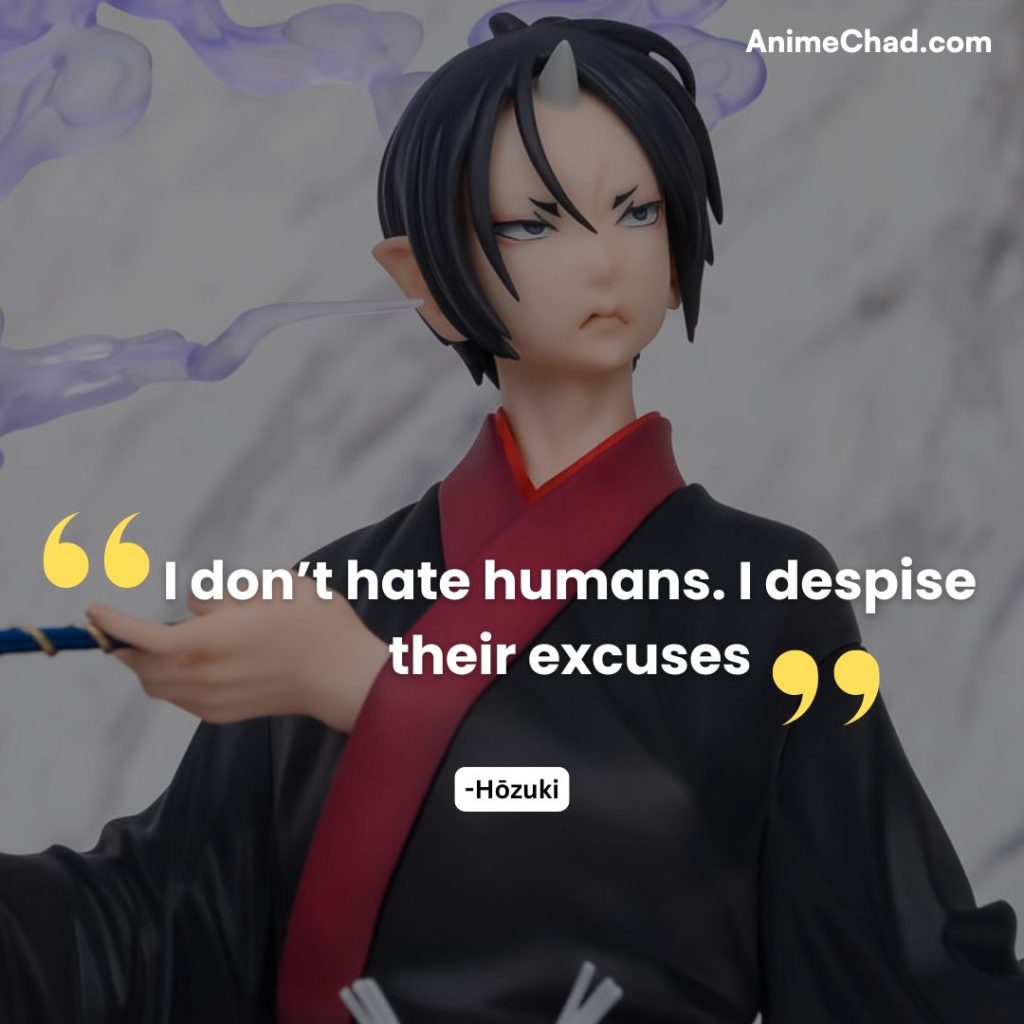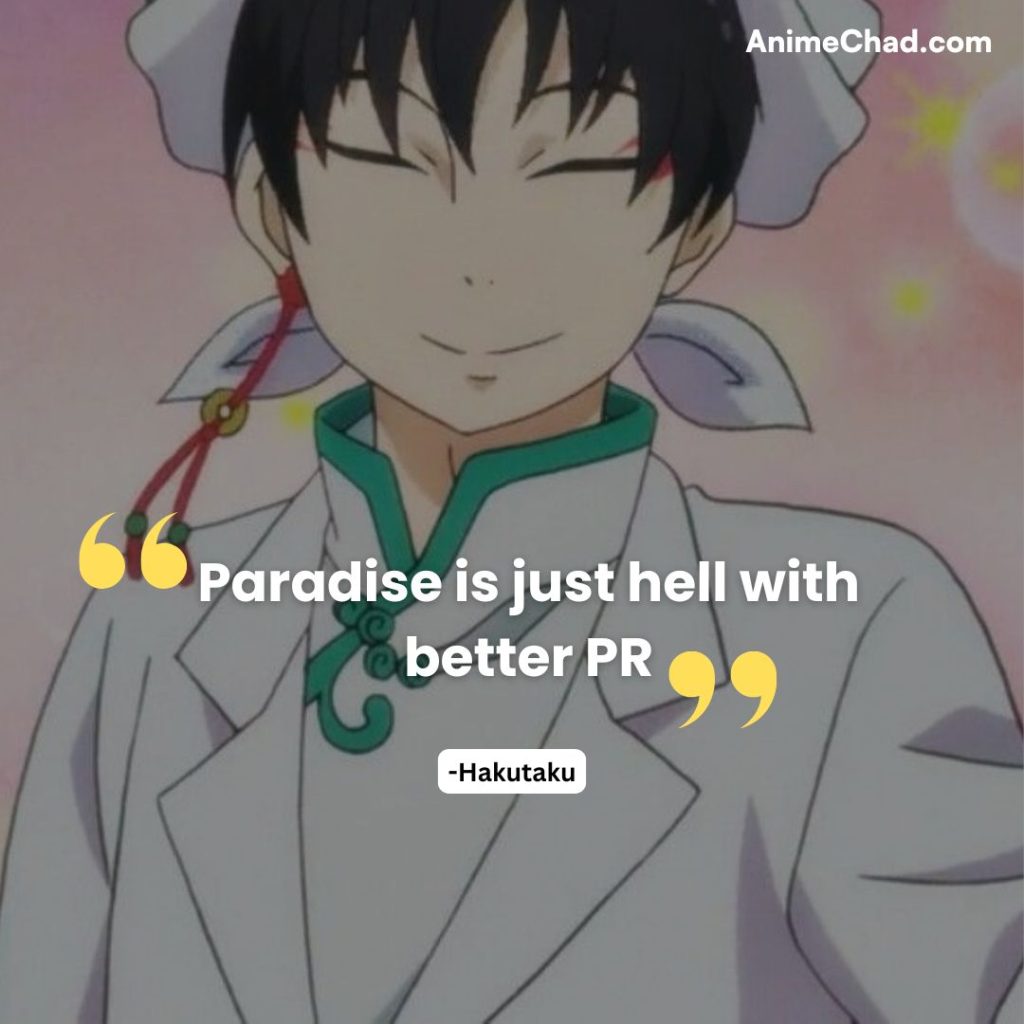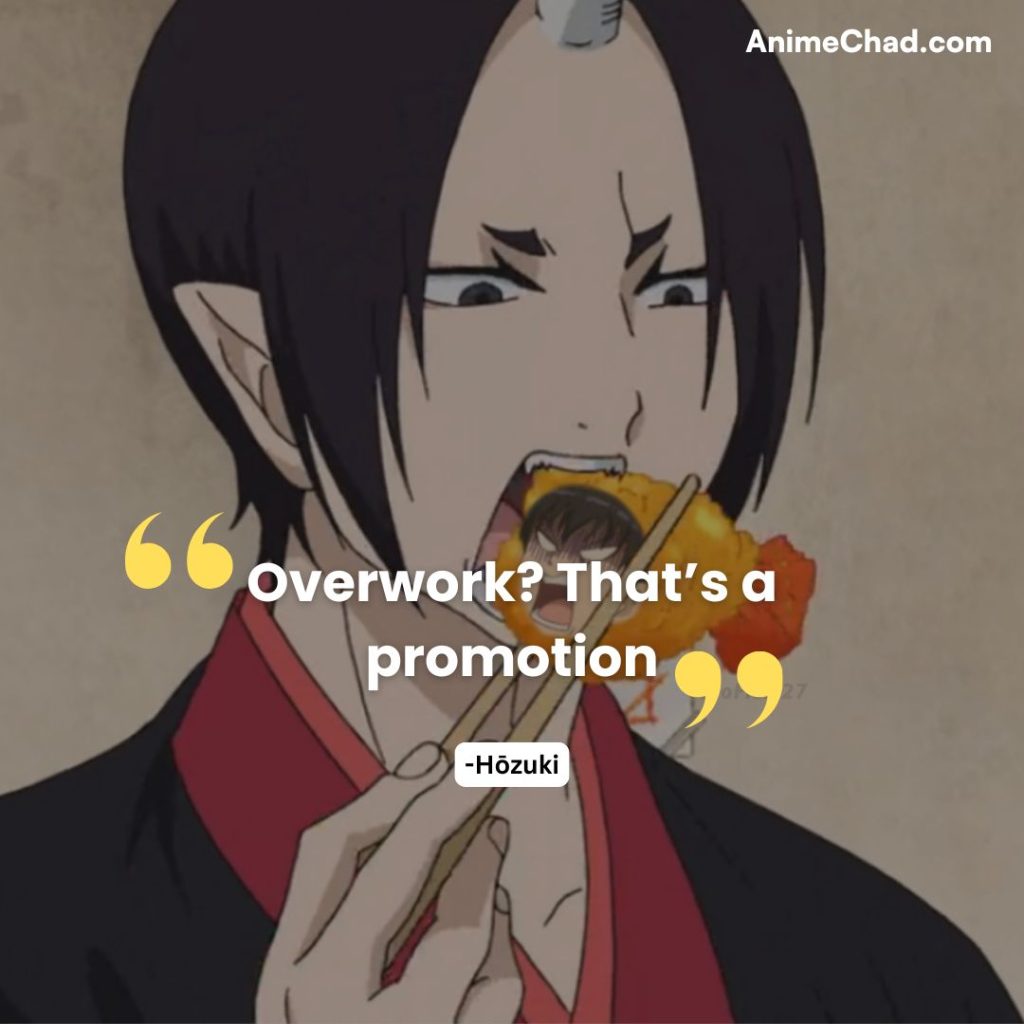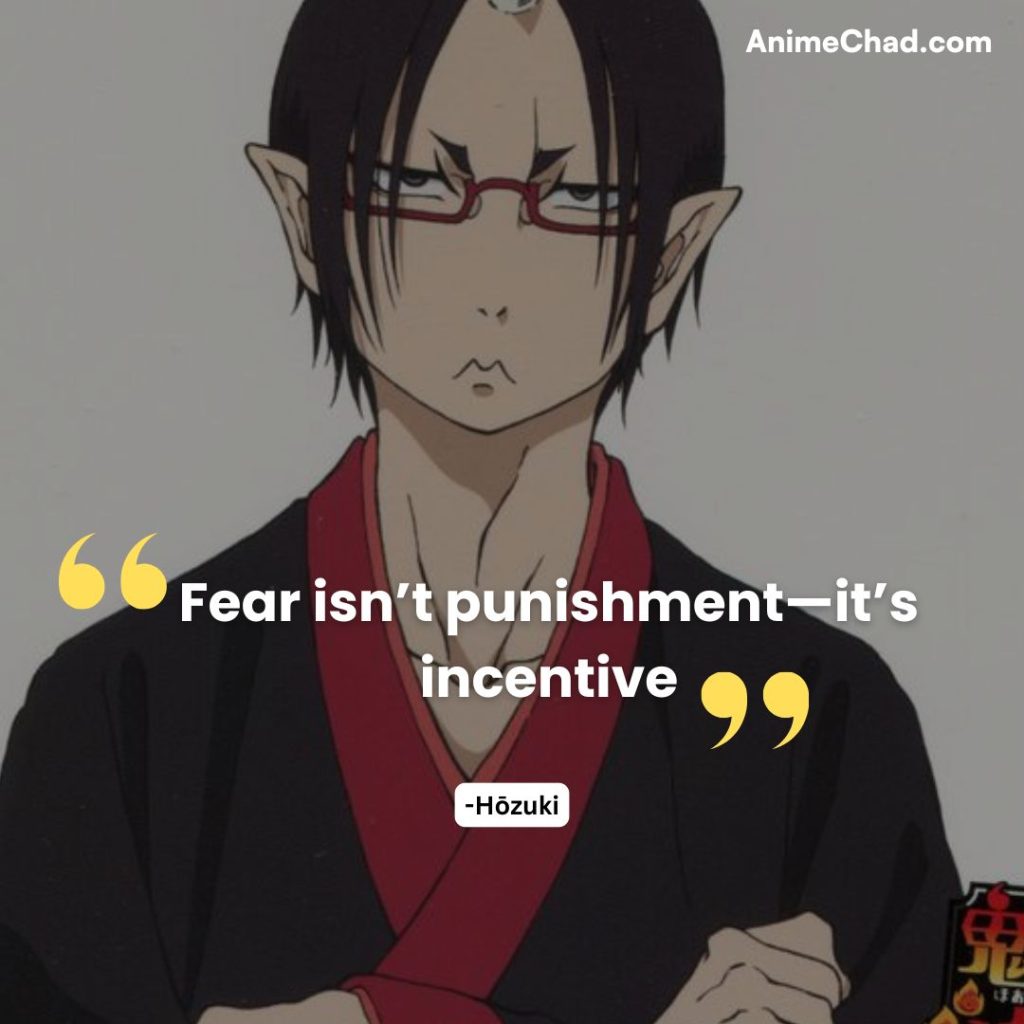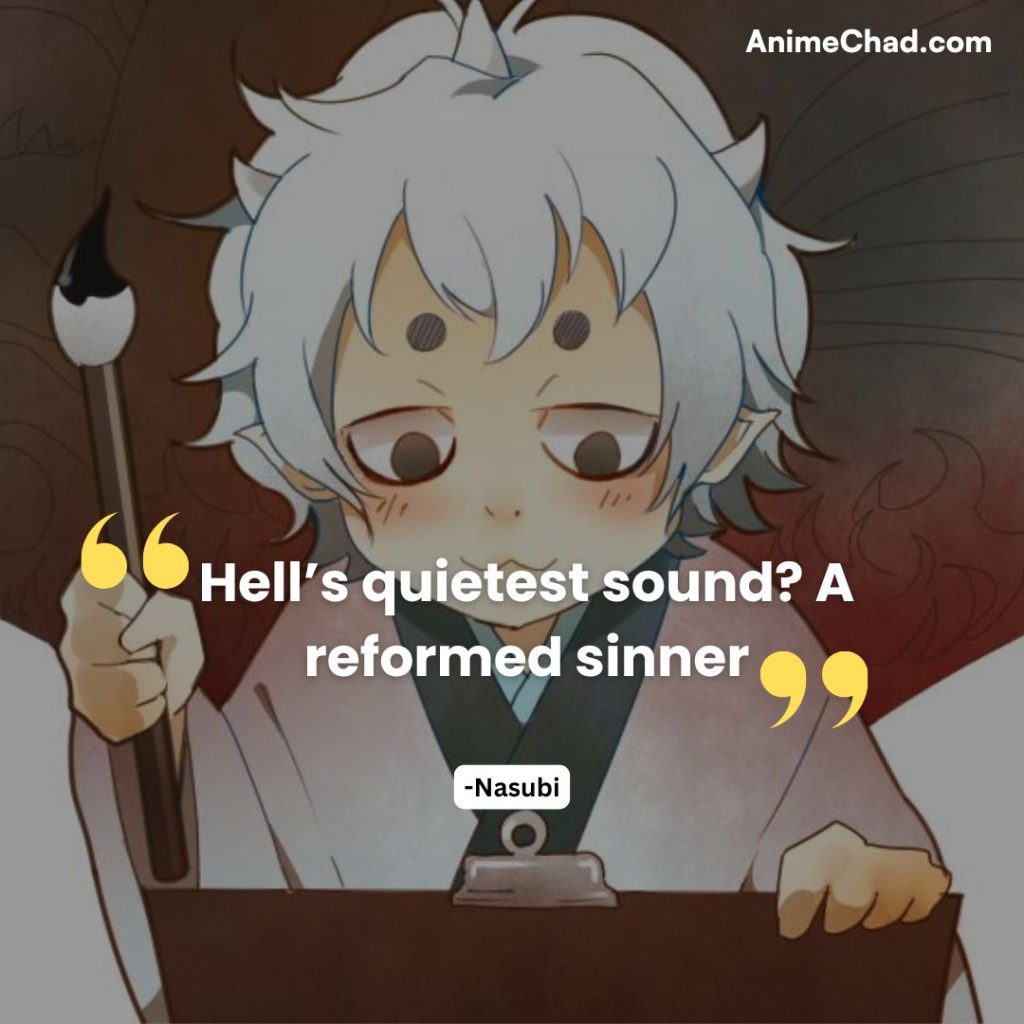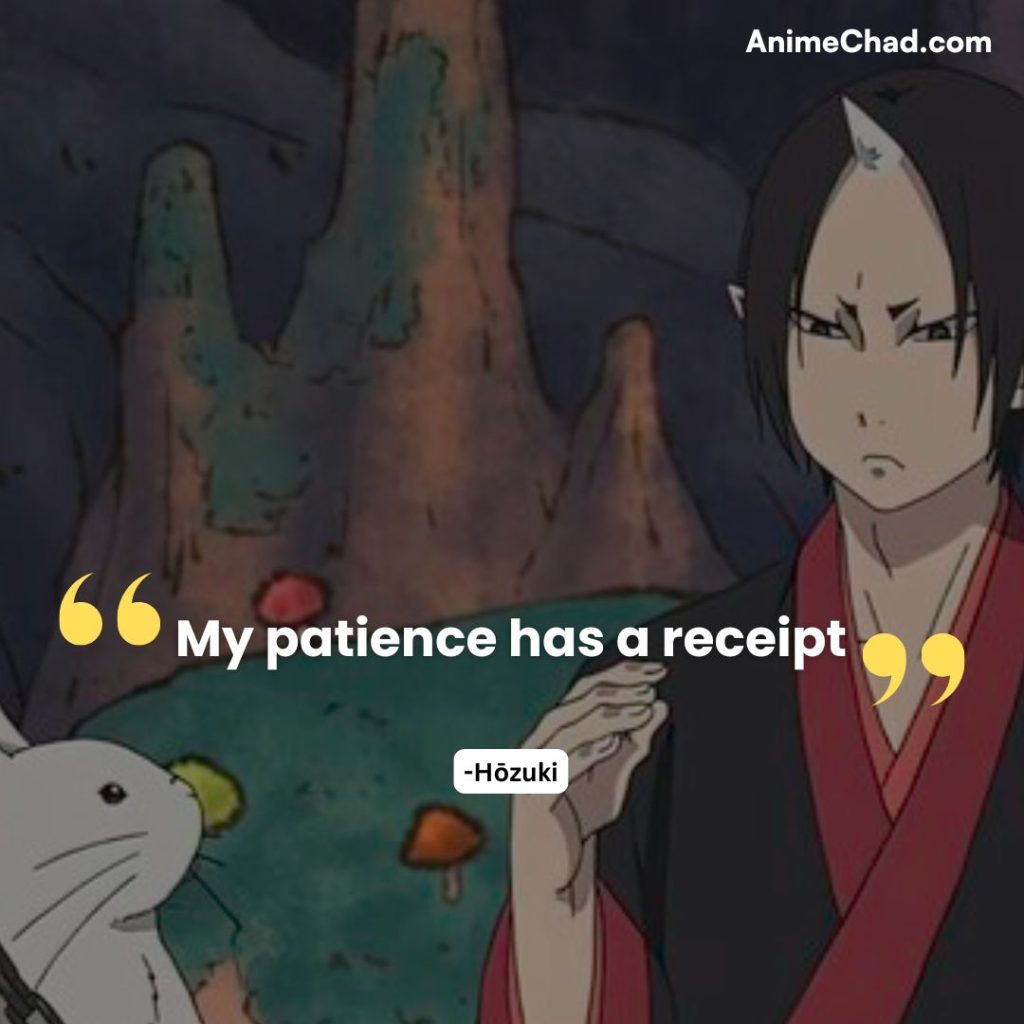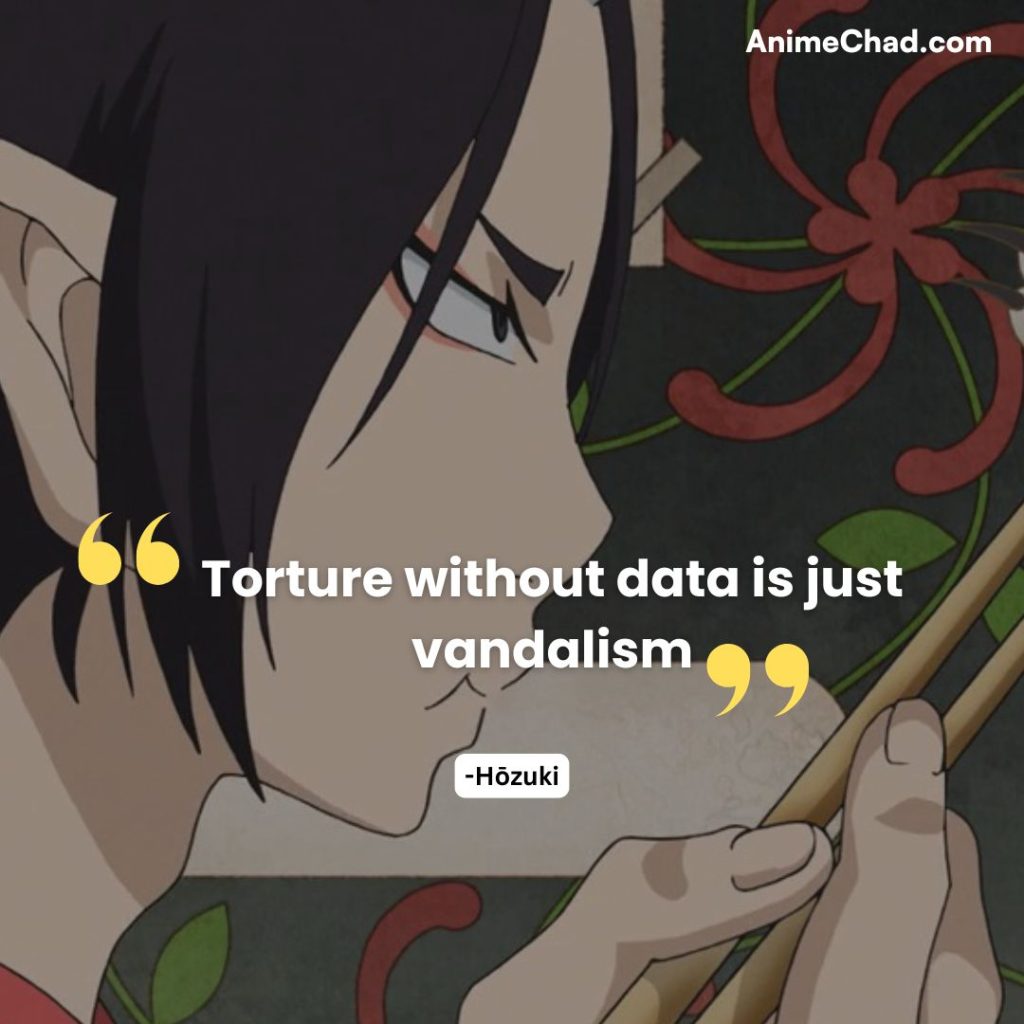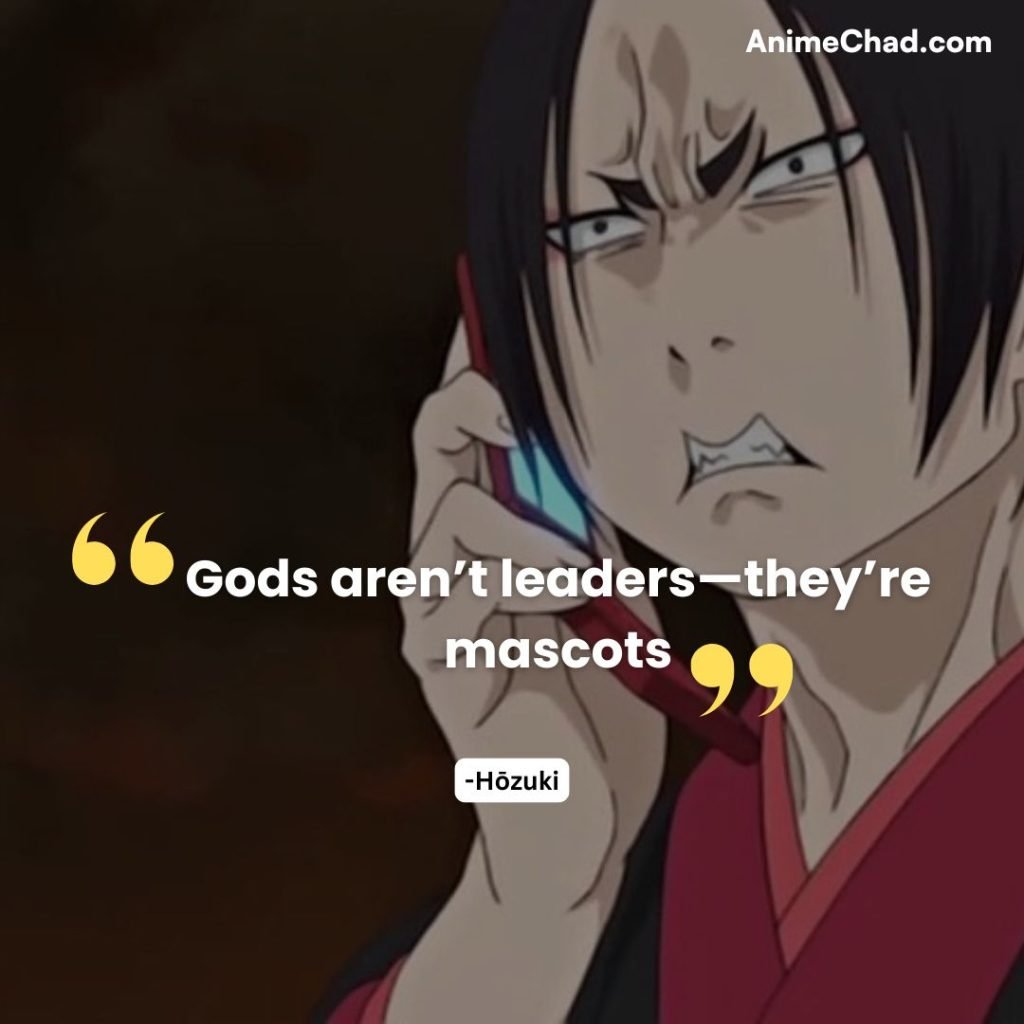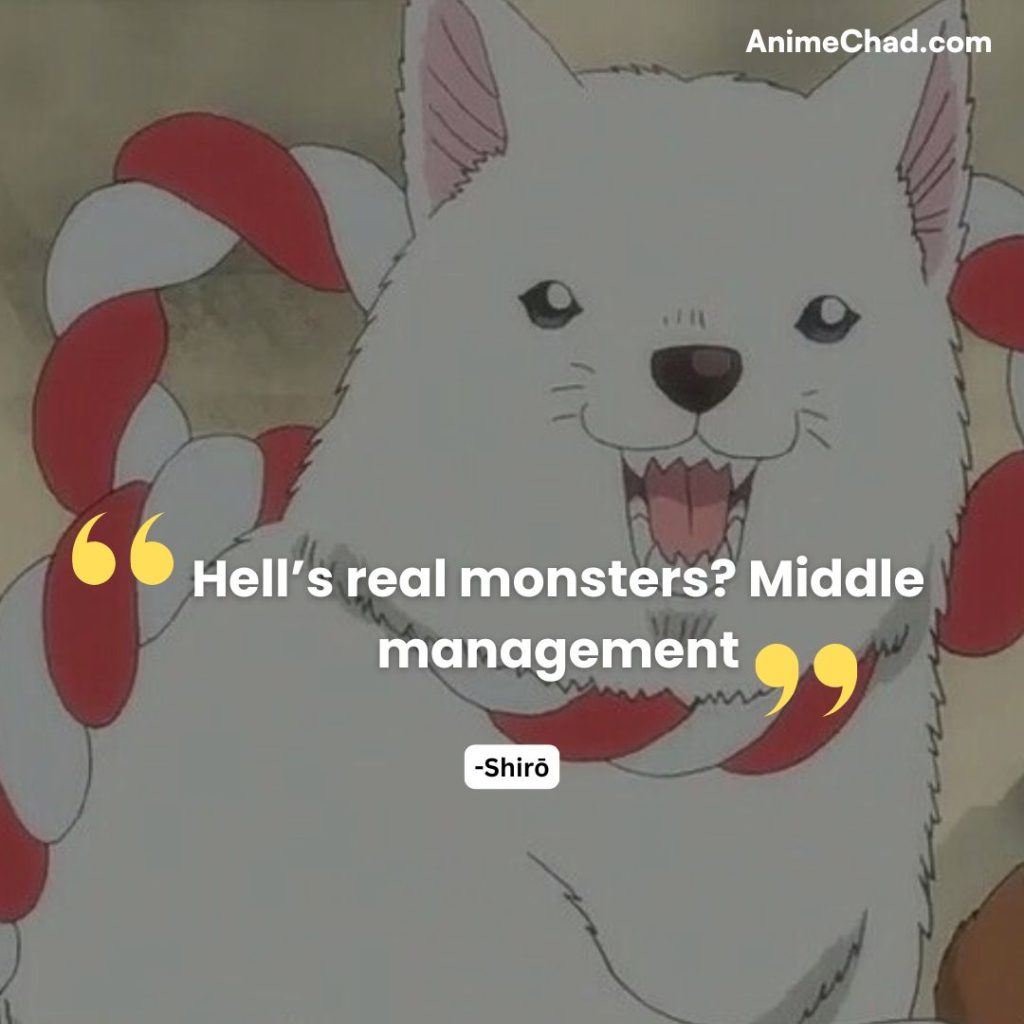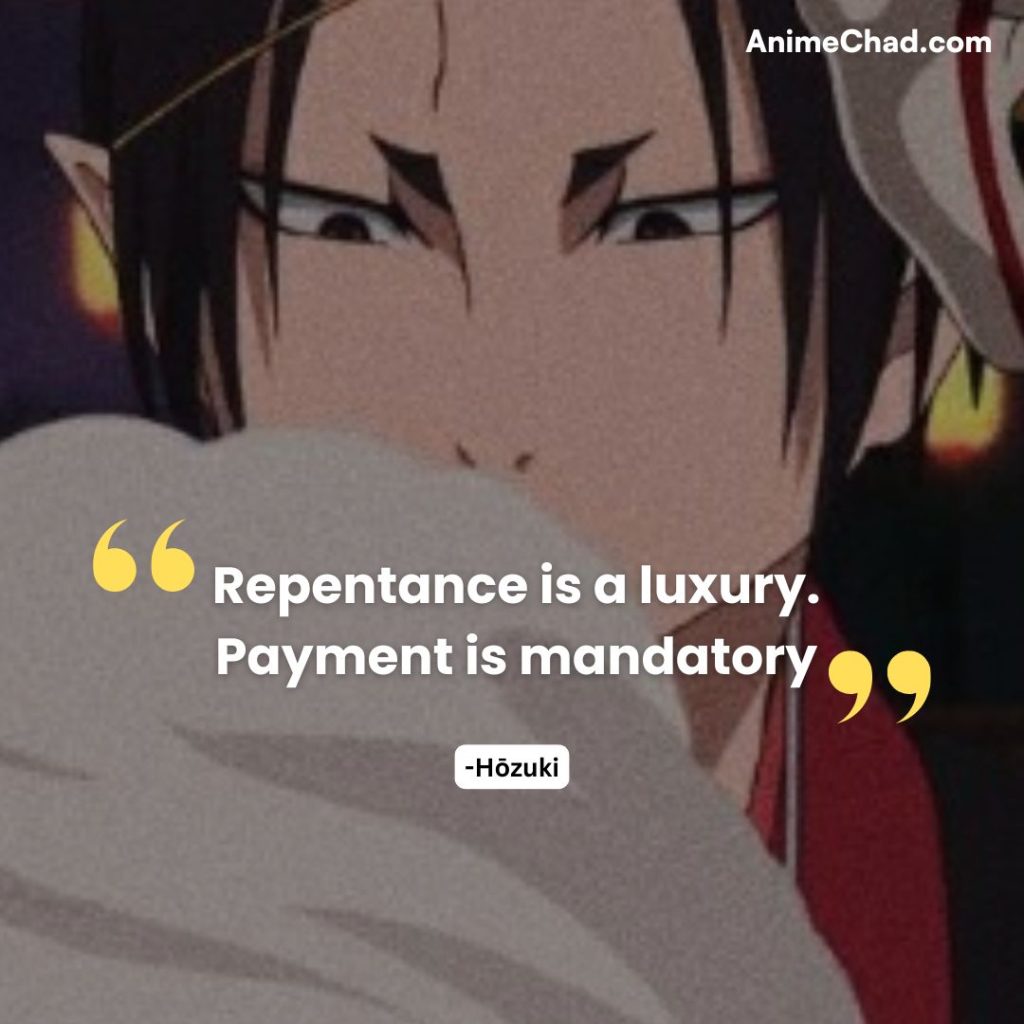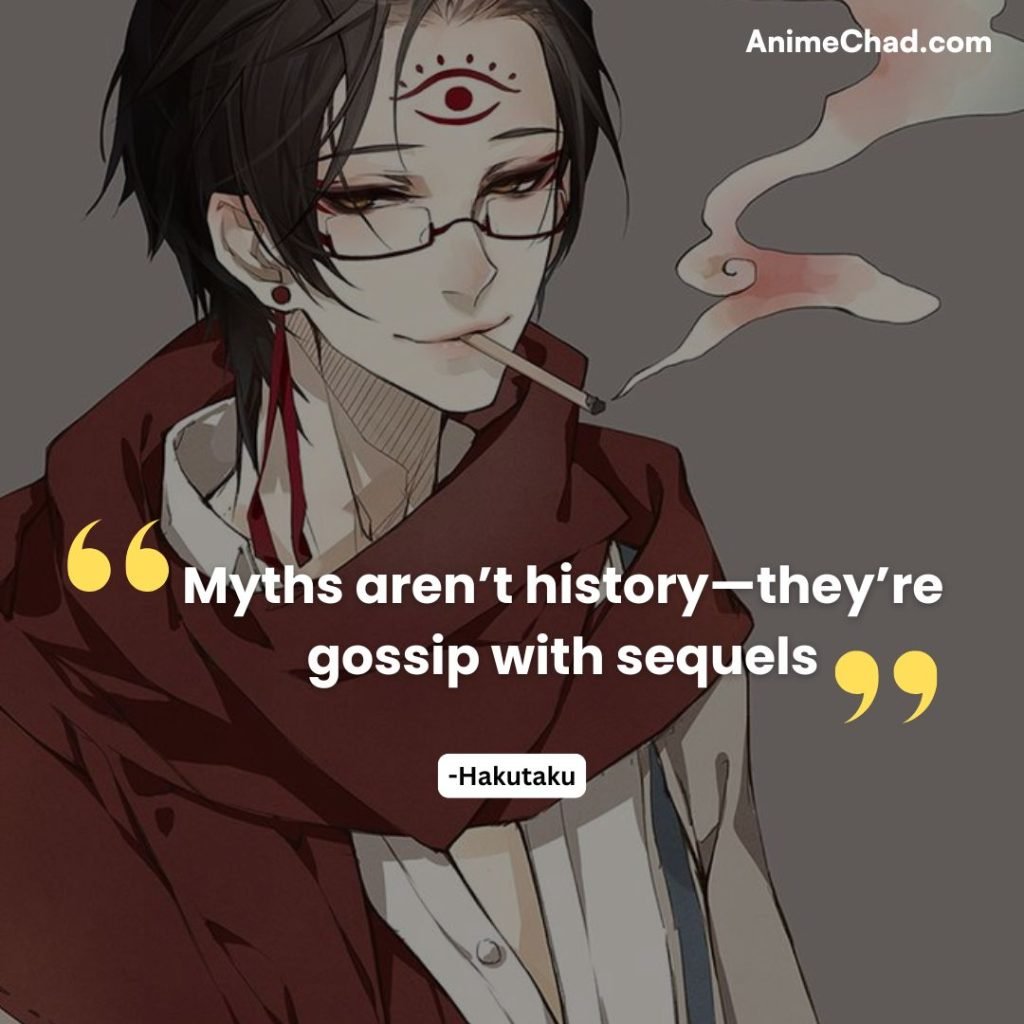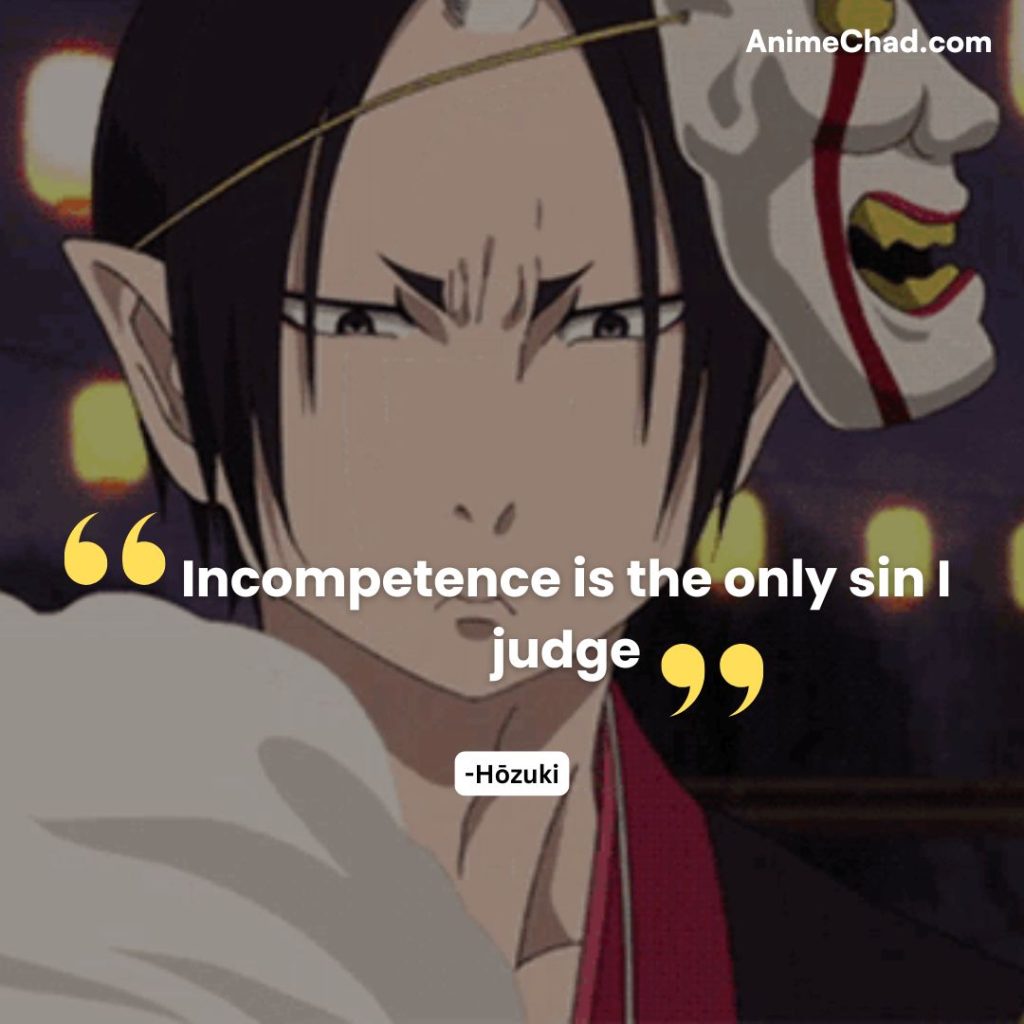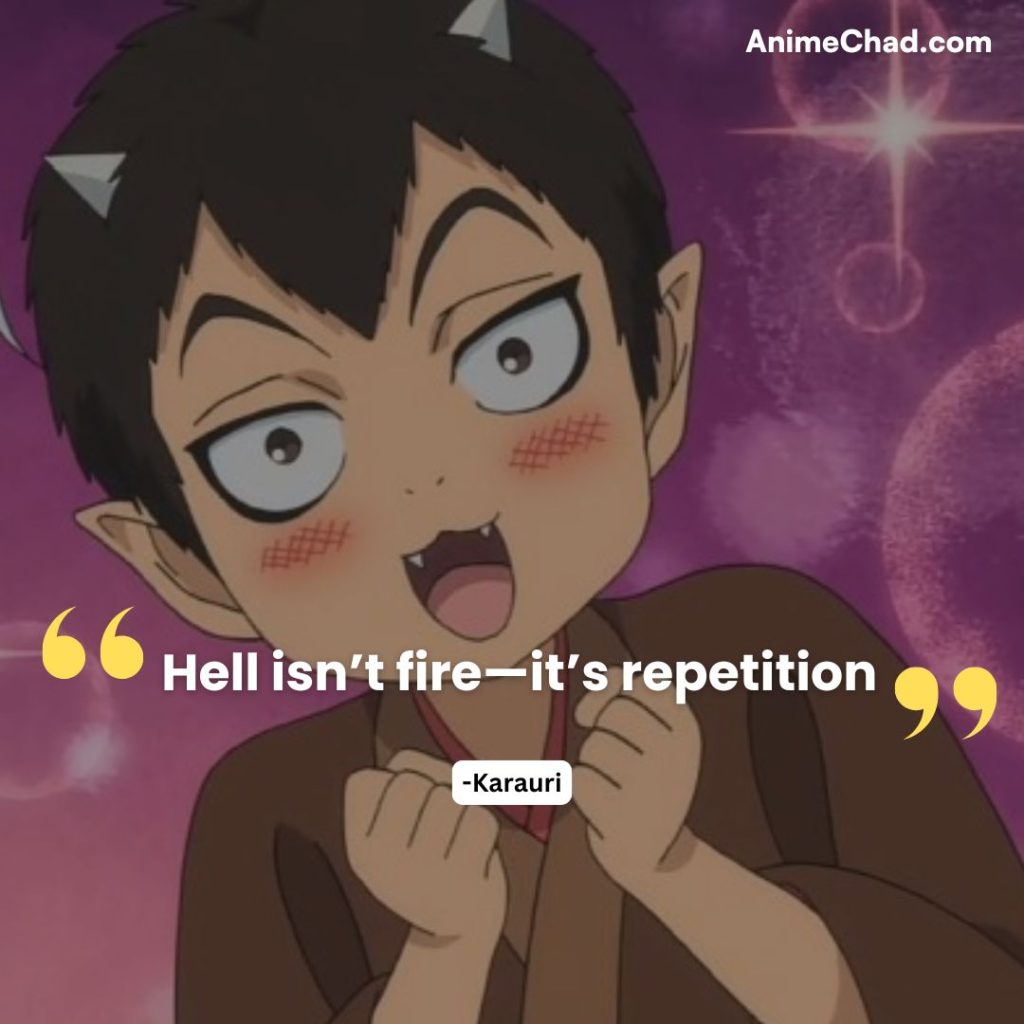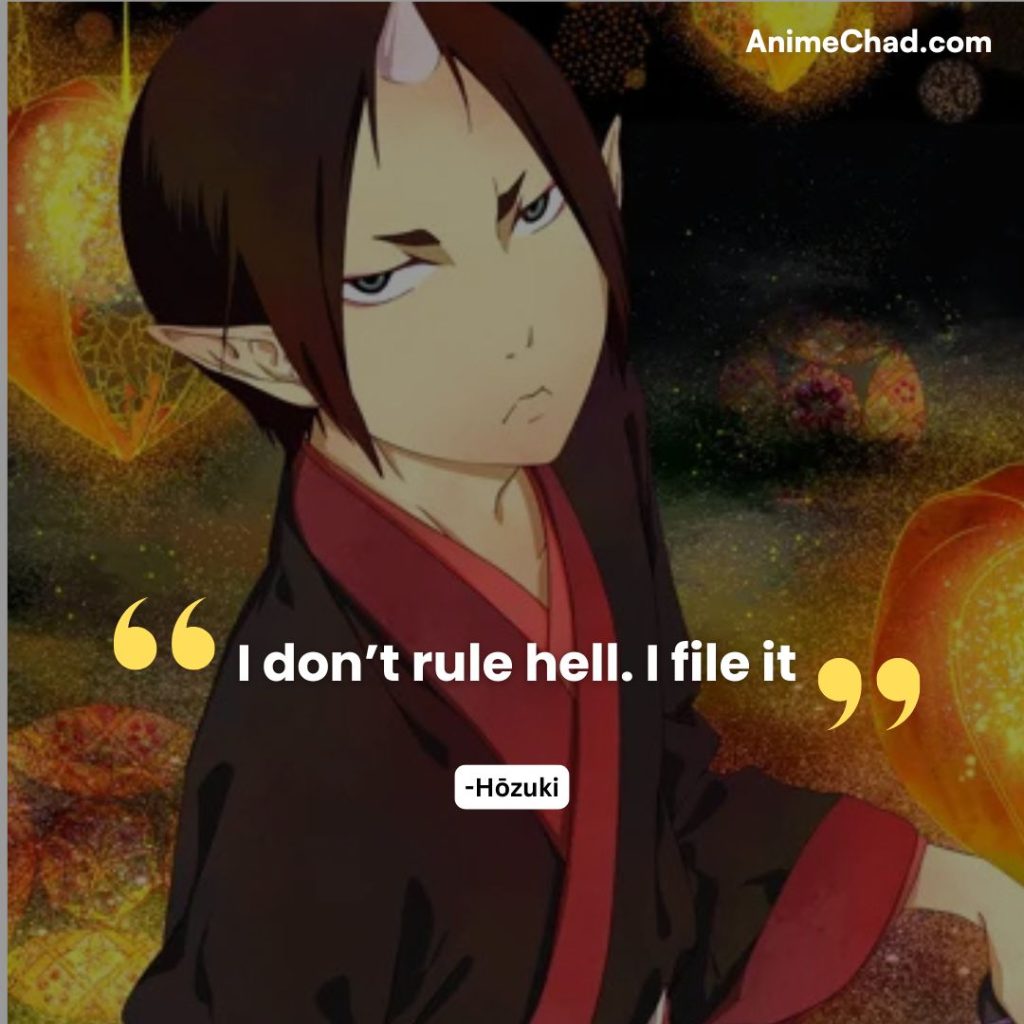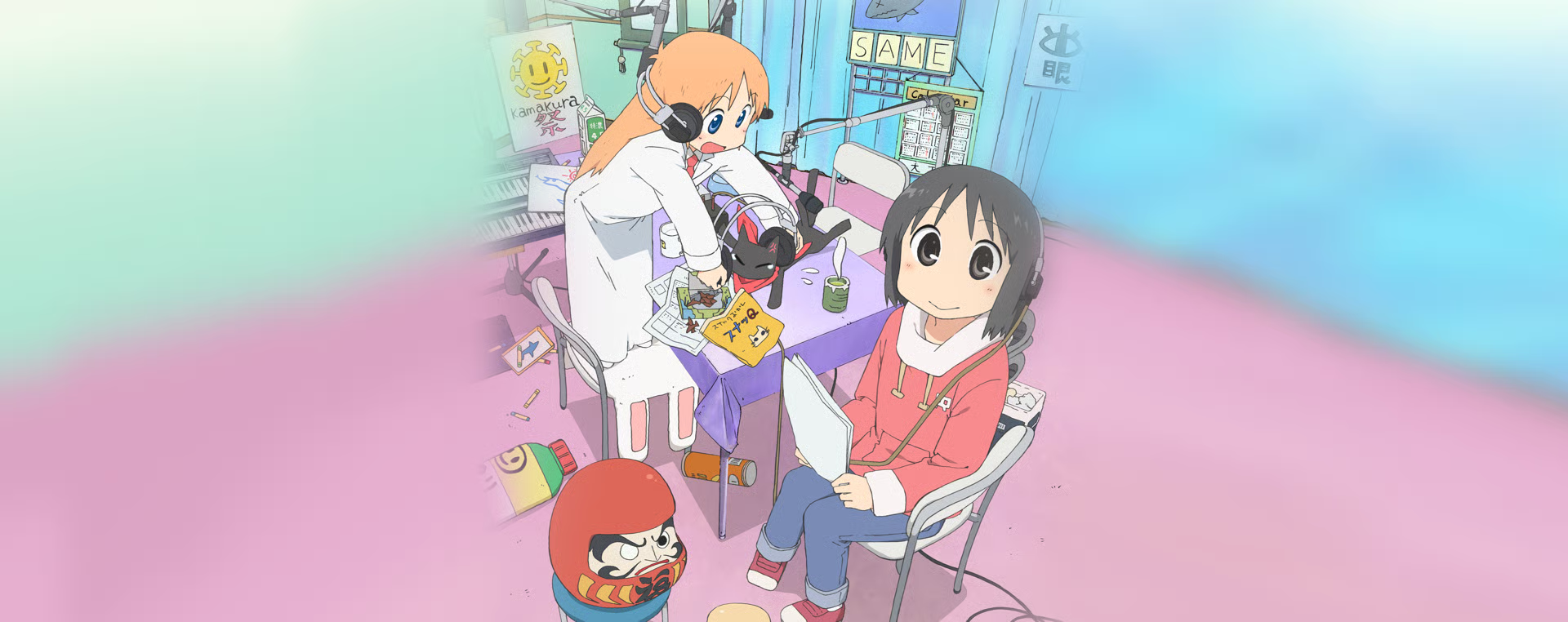Hozuki’s Coolheartedness follows the demon bureaucrat Hōzuki as he manages the chaotic underworld with ruthless efficiency, blending dark humor, Japanese folklore, and workplace satire.
The series explores themes of order vs. chaos, the absurdity of bureaucracy, and the moral ambiguity of justice.
This collection highlights quotes that encapsulate its sharp wit, mythological depth, and Hōzuki’s unflappable demeanor.
Careless is the greatest enemy
Episode 7 (The Devil’s Budget Is Saved by Neighborliness)
Hōzuki
Hōzuki’s mantra during a budget crisis underscores his meticulous nature and critique of human inefficiency.
Hell runs on rules, not goodwill
Episode 1 (The Devil Arrives in Sasazuka)
Hōzuki
Establishes Hōzuki’s pragmatic philosophy while introducing Hell’s bureaucratic framework.
Even demons need vacation days
Episode 5 (The Devil and the Hero Save Sasazuka)
Shirō
Highlights the series’ workplace satire through Shiro’s deadpan complaint about underworld labor practices.
Punishment isn’t cruelty—it’s education
Episode 12 (The Devil Carries Out His Duties)
Hōzuki
Justifies Hell’s tortures as moral correction, reflecting the show’s darkly comedic view of justice.
You think heaven’s better? Try their paperwork
Episode 8 (The Hero Enters the Fray)
Hakutaku
Hakutaku’s jab at celestial bureaucracy mirrors Hōzuki’s critique of systemic inefficiency.
A goldfish’s memory lasts seven seconds. Yours should be shorter
Episode 3 (The Hero Experiences Human Warmth)
Hōzuki
Hōzuki’s icy threat to a forgetful subordinate exemplifies his zero-tolerance policy for incompetence.
Demons don’t apologize. We invoice
Episode 10 (The Devil and the Hero Take a Break from the Daily Routine)
Hōzuki
Blends corporate humor with supernatural lore, defining Hell’s transactional ethos.
Nostalgia is Hell’s cheapest torture
Episode 6 (The Devil Climbs the Stairway to School)
Nasubi
Nasubi’s observation during a soul’s punishment ties sentimentality to the series’ existential themes.
Efficiency requires occasional cruelty
Episode 4 (The Hero Experiences Human Warmth)
Hōzuki
Hōzuki’s defense of harsh methods during a staffing shortage reveals his utilitarian ethics.
Even Buddha’s threads can be cut
Episode 13 (The Devil and the Hero Do Some Honest Hard Work)
Hōzuki
Hōzuki severs a soul’s chance at salvation, showcasing his defiance of cosmic authority.
Hell’s best skill? Recycling resentment
Episode 2 (The Hero Stays at the Devil’s Castle for Work Reasons)
Karauri
Karauri’s quip about workplace culture underscores the series’ cyclical view of punishment.
I don’t hate humans. I despise their excuses
Episode 9 (The Hero Experiences a Fray)
Hōzuki
Hōzuki’s disdain for moral evasion reinforces his role as a merciless arbiter.
Paradise is just hell with better PR
Episode 11 (The Hero Stays True to Her Convictions)
Hakutaku
Hakutaku’s cynicism contrasts heavenly and hellish realms, deepening the moral gray areas.
Overwork? That’s a promotion
Episode 7 (The Devil’s Budget Is Saved by Neighborliness)
Hōzuki
Hōzuki’s response to employee burnout satirizes corporate exploitation with demonic flair.
Fear isn’t punishment—it’s incentive
Episode 5 (The Devil and the Hero Save Sasazuka)
Hōzuki
Explains Hell’s psychological tactics, aligning torment with behavioral conditioning.
Legends are just failures with good storytellers
Episode 8 (The Hero Enters the Fray)
Hakutaku
Hakutaku demystifies mythic figures, echoing the series’ subversion of folklore.
Hell’s quietest sound? A reformed sinner
Episode 12 (The Devil Carries Out His Duties)
Nasubi
Nasubi’s irony-laced remark critiques the rarity of genuine redemption.
My patience has a receipt
Episode 3 (The Hero Experiences Human Warmth)
Hōzuki
Hōzuki’s retort to a complaining soul merges accounting humor with infernal authority.
Torture without data is just vandalism
Episode 10 (The Devil and the Hero Take a Break from the Daily Routine)
Hōzuki
Reframes punishment as a scientific process, emphasizing his analytical approach.
Gods aren’t leaders—they’re mascots
Episode 6 (The Devil Climbs the Stairway to School)
Hōzuki
Hōzuki’s jab at King Enma highlights their dysfunctional mentor-protege dynamic.
Hell’s real monsters? Middle management
Episode 4 (The Hero Experiences Human Warmth)
Shirō
Shiro’s meta-commentary on bureaucracy adds layers to the show’s workplace parody.
Repentance is a luxury. Payment is mandatory
Episode 13 (The Devil and the Hero Do Some Honest Hard Work)
Hōzuki
Hōzuki prioritizes punitive justice over moral growth, reinforcing his unyielding ethos.
Myths aren’t history—they’re gossip with sequels
Episode 9 (The Hero Experiences a Fray)
Hakutaku
Hakutaku’s revisionist take on folklore mirrors the series’ playful myth-bending.
Incompetence is the only sin I judge
Episode 2 (The Hero Stays at the Devil’s Castle for Work Reasons)
Hōzuki
Hōzuki’s disdain for inefficiency overrides traditional moral binaries.
Hell isn’t fire—it’s repetition
Episode 11 (The Hero Stays True to Her Convictions)
Karauri
Karauri’s existential insight during soul-processing critiques monotony in eternal punishment.
I don’t rule hell. I file it
Episode 1 (The Devil Arrives in Sasazuka)
Hōzuki
Hōzuki’s opening line defines his role as Hell’s meticulous administrator, not its master.
Why These Quotes Resonate
These lines epitomize Hozuki’s Coolheadedness’s fusion of dark comedy, mythological satire, and bureaucratic cynicism.
From Hōzuki’s ice-cold pragmatism to Hakutaku’s wry observations, each quote reinforces the series’ core theme: order thrives not on power, but on relentlessly efficient paperwork.
Their balance of wit and depth makes them timeless anchors to Hell’s most entertaining operations manual.

